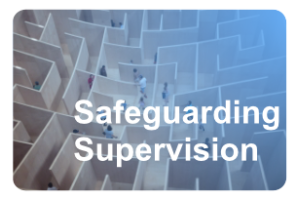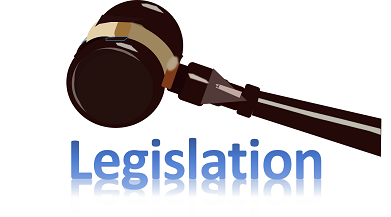Safeguarding News April 2025
Dear Colleague
Welcome to the May 2025 edition of SAFEcic's Safeguarding Newsletter highlighting key safeguarding news stories, updates on recent safeguarding guidance and new legislation from April 2025 — the sunniest April on record!
The newsletter is just one of a number of free tools we provide to help you stay informed and proactive and there are a number of additional free practical resources available on our website.
As we move into the last days of spring, it’s a timely moment to look forward and provide new solutions that support the ever-changing requirements across the safeguarding landscape and to that end we spotlight two brand new Zoom-based training courses, designed to meet the needs of safeguarding leads and deputies across a number of sectors.
Designated Safeguarding Leads’ (DSL) Update
Stay ahead in your safeguarding responsibilities with our 2 hours Designated Safeguarding Leads’ (DSL) Update via Zoom. Specifically designed for DSLs in educational settings, this essential update equips delegates with the latest knowledge of Keeping Children Safe in Education and the tools to ensure robust safeguarding practices.
equips delegates with the latest knowledge of Keeping Children Safe in Education and the tools to ensure robust safeguarding practices.
Through a focused programme that includes real-world case studies, multi-agency reviews, and lessons from recent audits, delegates will enhance their ability to address contextual safeguarding issues, maintain effective records, and scrutinise and measure the impact of their safeguarding arrangements.
The course also contains useful information when working with young people who are transitioning into adulthood.
Stay compliant, informed, and confident in protecting the children and young people in your care.
Working Together
Strengthen your multi-agency safeguarding practice with our comprehensive 2.5 hours Working Together training session via Zoom. Designed for professionals who lead or deputise for safeguarding across education, health, social care, police and other key services, this course equips delegates with the knowledge and skills to collaborate effectively and put the child at the centre of every intervention.
and skills to collaborate effectively and put the child at the centre of every intervention.
You’ll gain a clear understanding of key legislation, guidance, and local Safeguarding Partnership procedures, while developing your ability to reflect the voice of the child in all assessments and plans.
Explore vital topics such as professional curiosity, cultural competence, information sharing, and managing professional differences, with a focus on real-world application. The course also contains some useful information when working with young people who are transitioning into adulthood
This training is essential for those committed to high-quality, child-focused, multi-agency work.
SAFEcic's Other Products and Services
Safeguarding Supervision
Effective safeguarding Supervision provides support, coaching and training for staff supervision and promotes the interests of  children and adults at risk. Supervision will foster a culture of mutual support, teamwork and continuous improvement, which encourages reflection and confidential discussion of sensitive issues.
children and adults at risk. Supervision will foster a culture of mutual support, teamwork and continuous improvement, which encourages reflection and confidential discussion of sensitive issues.
To find out more, email This email address is being protected from spambots. You need JavaScript enabled to view it.
Safeguarding AuditsSAFEcic offers both Desktop and On-site Audits that include comprehensive policy reviews, recruitment and record keeping processes, personnel interviews and safeguarding walks to audit premises, activities and services.
The expert SAFEcic team has been providing safeguarding audits and pre-inspection audit services for over 25 years. We offer them for a wide range of organisations including charities, businesses, faith groups, leisure, health and education. Find out more.
SAFEcic's Rapid Review Service is a proven, cost-effective and efficient way for busy managers, directors and trustees across many sectors (including Ofsted, CQC and Charity Commission regulated organisations) to gain external, expert insight and support to help their organisation attain the highest level of safeguarding culture, policy, procedures and practice.
A Rapid Review takes just two hours of management time via Zoom or Teams and the price includes preparation of a high-level assessment report and an action plan to efficiently and cost effectively address any identified issues. Find out more or book a Rapid Review
SAFEcic provides DBS Check applications and administration.
Effective Safeguarding Record Keeping
This new two-hour live Zoom training is designed to highlight key legislation and statutory guidance related to record keeping. The session will define the meanings of confidentiality, consent, information sharing, privacy, mental capacity, record storage and retention periods, data protection and UK GDPR in relation to safeguarding record keeping.
All delegates must already have a current Leading on Safeguarding training certificate in place before attending this course.
For further information click here
Professional Boundaries Training
The Professional Boundaries Training course is focused on the professional boundaries within a manager's own role and responsibilities. The course is designed for managers of all those who work or volunteer directly, with children, young people, adults at risk and/or their families or carers. All delegates must already have current Safeguarding training certificates in place, as relevant to their role, prior to attending this live 2 hour course via Zoom.
Delegates will gain an understanding of the concept of the duty of care and the code of conduct required when working with children, young people and adults who may be at risk. We look at issues which challenge professional boundaries in the organisation and debate possible scenarios and the actions that need to be taken when there is a concern that professional boundaries have been breached.
The course includes a digital resource pack and certificate of attendance or each delegate, valid for three years
For further information click here
Single Central Record
Single Central Record (SCR) live 2 hours Zoom course with one of our experts and designed for education colleagues. This thorough, detailed and fully up to date course is essential for all those involved with managing and reviewing the SCR in regulated educational settings, in line with Ofsted and KCSIE expectations.
For further information click here
Training Schedule
Our latest training schedule is listed below and feel free to share this email with your colleagues and they too can join our newsletter database.
To sign up simply click here.
SAFEcic Blended Learning Training Calendar
Designated Safeguarding Leads’ (DSL) Update
View available dates
Working Together
View available dates
Professional Boundaries Training live online Zoom training
View available dates
Effective Safeguarding Record Keeping live online Zoom training
View available dates
Single Central Record (SCR). Managing, Reviewing and Updating live online Zoom training
View available dates
Leading on Child and Adult Safeguarding online course plus live online Zoom training
View available dates
Standard Child and Adult Safeguarding online course plus live online Zoom training
View available dates
Safeguarding: Trustees’ legal responsibilities online course plus live Zoom training
View available dates
Safer Recruitment Training online course plus live Zoom training
View available dates
Managing and Leading on International Safeguarding online course plus live online Zoom training
View available dates
SAFEcic's free hub resources by setting are available through the SAFEcic.co.uk main menu. Alternately you can bookmark the links below:
Education | Dental | Charities | GP & Primary Medical Services | Fath Groups | Entertainment & Leisure | Working Overseas |
Legislation and Guidance

England and Wales
Crime and Policing Bill
The government will introduce new legislation to stop Sentencing Council's guidelines coming into effect
New sentencing guidelines that would mean differential treatment for different races and religions is being blocked under new legislation the Lord Chancellor has announced.
The government will work with Parliament to fast-track this legislation, which will clarify that guidance relating to sentencing reports should not single out specific cohorts for differential treatment when it comes to ordering Pre-Sentencing Reports, which help judges make decisions on sentencing. The measures in the Crime and Policing Bill will extend and apply to England and Wales only.
England, Wales, Scotland and Northern Ireland
New Act
The Terrorism (Protection of Premises) Act 2025, also known as Martyn’s Law, received Royal Assent on Thursday 3 April 2025.
This Act delivers the Government’s manifesto commitment to strengthen the security of public premises and events. The Government would like to pay tribute to Figen Murray, mother of Martyn Hett, who was killed in the Manchester Arena attack. Her campaigning has been crucial in driving this Act forward.
The Government intends for there to be an implementation period of at least 24 months before the Act comes into force. This will allow the Security Industry Authority’s (SIA) new function to be established, whilst ensuring those responsible for premises and events in scope have sufficient time to understand their new obligations. This will enable them to plan and prepare appropriately.
The law will improve protective security and organisational preparedness across the UK by requiring that those responsible for certain premises and events consider how they would respond to a terrorist attack. In addition to this, at certain larger premises and events, appropriate steps to reduce vulnerability to terrorist attacks must also be considered. Through the Act, qualifying premises and events should be better prepared and protected, ready to respond in the event of a terrorist attack.
Whilst those that fall within scope of the Act may wish to begin considering the requirements, they should note that guidance will be published in due course. This guidance will assist in understanding the requirements set out in the legislation. The guidance is being designed to be easy to follow, needing neither particular expertise nor the use of third-party products or services.
To support enforcement of the regime, a regulator will be established through a new function of the Security Industry Authority (SIA), which will support, advise and guide those responsible for premises and events in meeting the requirements of this legislation.
Premises that satisfy the following four criteria fall within scope of the Act:
- There is at least one building (or the premises are in a building)
- The premises are wholly or mainly used for one or more of the uses specified at Schedule 1 to the Act, e.g. a restaurant or a shop
- It is reasonable to expect that at least 200 individuals may be present at least occasionally; and
- The premises are not excluded under Schedule 2 to the Act
If 800 or more individuals may be expected, the premises will be an enhanced duty premises unless the Act says otherwise. For qualifying premises, the responsible person is the person who has control of the premises in connection with their relevant Schedule 1 use (e.g. the use of a venue as a sports ground or a hotel). Where there is more than one Schedule 1 use (e.g. a church that also has a creche), it will be the person in control of the premises in connection with whichever Schedule 1 use is the principal use.
For qualifying events, the responsible person is the person who has control of the premises at which the event will be held for the purposes of the event. The circumstances of the event will need to be considered to determine who the responsible person is. For example, if a concert is to be held in a park and the company putting on the event takes control of an area of the park for the purposes of that concert, the company putting on the event will be the responsible person. Conversely, if a stately home puts on a concert in its grounds and maintains control of the site for the purposes of that concert, the stately home will be the responsible person. This would be the case even if the stately home contracted organisations to do aspects of the event (e.g. to provide door security or ticketing).
Guidance will be provided in due course to assist those in scope to understand the requirements set out in the legislation. The guidance is being designed to be easy to follow, needing neither particular expertise nor the use of third-party products or services. The Home Office continues to build on the materials already published in relation to this legislation. This includes Government factsheets which set out key aspects of the legislation, social media promotion, various press releases, media briefings, and the substantial stakeholder engagement campaign.
Inquires, Reviews, Consultations, Responses and Actions

1. Safeguarding Practice Review commissioned: David Tudor
A Safeguarding Practice Review (SPR) has been jointly commissioned by the National Safeguarding Team and the dioceses of Chelmsford and Southwark to look at the lessons to be learnt from the Church’s handling of the David Tudor case.
David Tudor, a former Rector in Chelmsford Diocese, was prohibited from ministry for life in October 2024 following two complaints under the Clergy Discipline Measure. The penalty imposed followed a full admission of guilt to disclosures of serious sexual abuse from the two complainants, relating to the time when he was a priest in the Diocese of Southwark.
SPRs, formerly known as lessons learnt reviews, were set up under the new Safeguarding Code of Practice approved at General Synod in July 2023.The SPR is a process to improve safeguarding practice through learning, particularly outcomes for victims and survivors. It is not a re-investigation of the case but if the review highlights serious safeguarding concerns relating to the practice of others then appropriate action will be taken under the Responding guidance .The SPR will examine the allegations against David Tudor, how the Church handled them over a long period of time and how it responded to victims and survivors. The reviewer will then apply the learning from this to improve practice and safeguarding arrangements in the Church of England, these findings will be contained in the final report which will be published. Support continues to be offered to those who have come forward.
Home Office Actions
2. Tackling child sexual abuse and exploitation: update
Minister Phillips delivered a speech on the government's plan to tackle child sexual abuse and exploitation on 8 April 2025:
“Child sexual abuse and exploitation are the most horrific and disturbing crimes – an abuse of power against those who are most vulnerable, leaving lifelong trauma and scars.
“Best estimates suggest that 500,000 children are sexually abused every year. Analysis by the police found that there were 115,000 recorded cases of child sexual abuse in 2023, 4228 group-based offences identified by the CSE Taskforce, of which 1125 were family abuse, and 717 were sexual exploitation cases. In a growing number of recorded cases the perpetrators themselves are under 18.
In its first year of operation up to March 2024, the Grooming Gangs Taskforce contributed to 550 arrests across the country. I can tell the House that – in the last 9 months of 2024 – the Taskforce contributed to 597 arrests.
Child Sexual Abuse and Exploitation (CSA) measures include:
- a new child sexual abuse police performance framework, including new standards on public protection, child abuse and exploitation
- legislating targeting online offending, including abuse and grooming enabled by AI (Artificial Intelligence)
- new powers for the Border Force to detect digitally held child sex abuse at the UK border
- new restrictions preventing registered sex offenders from changing their names to hide the threat they pose
- increased investment in law enforcement capability, through the Police Undercover Online Network and the Tackling Organised Exploitation Programme
3. Toughest measures yet to protect children from knife content
The government has announced even tougher action to hold tech platforms to account for failing to protect children from harmful knife crime content online.
As part of the Plan for Change, tougher sanctions will be brought in to combat the unacceptable content circulating online that advertises deadly and illegal knives and other offensive weapons to young people – or which glorifies or incites violence.
The government has already announced a significant fine of up to £10,000 for individual tech bosses whose platforms fail to remove this content within 48 hours following a police warning. Following significant consultation with the Coalition to Tackle Knife Crime, the government is going even further with an additional fine of up to £60,000 to be paid by the company. This means tech platforms and their executives could collectively face up to £70,000 in fines for every post relating to knife crime they fail to remove.
A greater range of online platforms will be liable under these new laws to also include online search engines as well as social media platforms and marketplaces, to capture all online providers which might currently be failing to remove content.
As previously announced, the Home Office will introduce a new system to be carried out by a new policing unit backed by £1.75 million of funding to tackle the sale of knives online. This will have a national capability and be run by the National Police Chiefs’ Council. They will be responsible for issuing Content Removal Notices which inform the tech platform of illegal content, giving them a 48-hour window in which they must remove it.
Failure to comply will now result in a Civil Penalty Notice rather than taking the company to civil court, which include the respective fines for both executives and the wider company. This will mean sanctions can be inflicted much more quickly and is the same penalty that an employer may receive for employing an illegal worker to reflect the vital importance of removing harmful knife related content.
These sanctions are part of a range of measures being introduced by this government in its mission to halve knife crime in a decade. These include:
- banning zombie-style knives and ninja swords, with a nationwide surrender scheme launching in July
- introducing stronger 2-step verification for online retailers selling knives online and banning delivery of weapons to alternative addresses that don’t match the buyer
- requirement for online retailers to report any bulk or suspicious-looking purchases of knives to the police
- launching a consultation in spring on the introduction of a licensing scheme for retailers who wish to sell knives
- increasing prison sentences for selling weapons to under 18s from 6 months to 2 years
- introducing a new offence for possessing a weapon with intent for violence with a prison sentence of up to 4 years
Charity News
4. Mencap responds to latest data on the inappropriate detention of people with a learning disability and/or autistic people. and highlights major concerns on the inappropriate detention of people with a learning disability and/or autistic people. Mencap, along with The Challenging Behaviour Foundation, National Autistic Society and other organisations have written a letter to the Minister of State for Care, Stephen Kinnock MP, urging swift action to address the situation.
“It’s of great concern that every national target to transform care for people with a learning disability and / or autism to date, has been missed and the situation is now starting to go backwards in many areas. This new data shows there is an unacceptable postcode lottery for those trapped in mental health units and their families desperate for them to come out.
“Thousands of people are still being locked away, often for years on end, many due to a lack of suitable community support – not because they need inpatient mental health treatment. In these settings, people can be subjected to physical restraint and kept in solitary confinement for months on end, leaving people with lasting trauma.
“The Government, health bodies and local authorities must acknowledge that progress is unravelling in many areas and take action to address this. It’s unacceptable that an increasing number of local areas are failing to meet long promised targets to reduce the number of people in mental health hospitals and alarmingly, we’re seeing inpatient rates rising in a significant number of local areas too.
“Through reform of the Mental Health Act the Government aims to end the inappropriate detention of people with a learning disability and autistic people but the key change in the law that will make a difference will only be activated when ‘sufficient community support’ is in place. It’s hard to see how this will be achieved when there’s a lack of community support, ongoing cuts and no plan to improve the situation.”
Regulatory Bodies

Ofsted
1. Changes to social care inspections aimed at improving stability for vulnerable children
Ofsted is making some important changes to the way children’s social care providers are inspected, aimed at improving support for children with complex needs.
The changes to the Social Care Common Inspection Framework (SCCIF) are mainly for the benefit of children’s homes and fostering agencies. They are intended to encourage more homes and agencies to look after children with high or multiple needs, with added reassurance that this will not negatively affect their Ofsted rating.
Ofsted research published last year found that 91% of local authorities struggle to find suitable homes for children with complex needs. Some children wait months, or even years, for a stable placement. The research also found that concerns about Ofsted ratings were cited by local authorities as a frequent reason for homes rejecting referrals of children with complex needs. Local authorities felt that good and outstanding-rated homes in particular were hesitant to look after these children, due to fears of being downgraded at their next inspection.
As a result, children with complex needs are too often living far from family or friends, experiencing multiple moves, or are accommodated in unsuitable and unregistered homes.
The small number of changes to the SCCIF guidance, including the criteria which inspectors use to evaluate practice, will put a sharper focus on:
- how providers promote and sustain stability for children, including those with high needs
- a provider’s placement decisions, including how they balance the needs of a child requiring a placement with those of children already living in the home
- the timeliness of a provider’s work to prepare children for their next move
- how accurately placement decisions reflect a provider’s statement of purpose
The effectiveness of providers’ work with partners to achieve greater stability for children, especially for those at most risk of instability and uncertainty in their lives, will be central to inspections.
The updated framework reflects Ofsted’s commitment to putting children’s needs at the heart of the inspection process. The changes have been made following continued engagement with social care stakeholders, including people with lived experience of the care system.
Inspectors will be trained on the changes to inspection guidance, as part of the added reassurance that providers will not be unfairly penalised for taking in children with complex needs.
Online Safety

1. Dark web site taken offline as information on 63 users passed to UK forces
Sixty-three UK-based users of a Dark Web site hosting child sexual abuse material have been identified following work by the National Crime Agency. Police in Germany started an investigation into the site, Kidflix, which resembled a well-known video streaming service.
They identified 1275 users from around the world who had either paid for access to material through crypto currency, or earned access through uploading their own material where they would earn site specific credits which would allow them access to further child abuse imagery.
After receiving information from the German authorities in February, NCA officers identified 63 UK users who were active on the site and had used cryptocurrency to access CSA material. Investigators then provided the intelligence to 28 UK forces so action could be taken.
To date, 30 people have been arrested in the UK and the Dark Web site has been taken down by the German authorities.
2. Most headteachers restrict mobile phones in school hours – but major new survey shows online harms still among their biggest concerns
Children’s Commissioner for England Dame Rachel de Souza states:
“Over the last four years, I have spoken to a million young people and thousands of parents about the most pressing issues facing children growing up in England today. One issue that comes up time and again – from children, parents, and professionals alike – is online safety. While digital technology provides young people with unprecedented access to information and opportunities, it also exposes them to significant risks: harmful content, online bullying¸ the dangers of exploitation and grooming, and simply spending too much time online.
“A key area of debate in recent months has been the role of mobile phones in children’s lives, particularly in schools, and whether children’s use of phones at school – and more generally – should be restricted. This led me to question what was really happening in practice across our schools and colleges when it came to mobile phone restrictions.
“That is why, when I used my statutory powers to conduct the largest-ever survey of schools and colleges last year, I included questions on how schools were managing children’s phone use.
“This landmark research, with responses from 19,000 schools and colleges – representing nearly 90% of schools and colleges in England – provides the first comprehensive national evidence on smartphone policies. The findings are clear: the overwhelming majority of schools – 99.8% of primary schools and 90% of secondary schools – already have policies in place that limit or restrict the use of mobile phones during the school day.
“While these policies are essential in maintaining focus, reducing distractions, and promoting positive behaviour in schools, they are only part of the solution. Schools tell us that, despite these policies, they remain deeply concerned about children’s online safety. That is because most of the time children spend on their phones is outside school hours. If we want to protect children, we must broaden our focus beyond school gates and ensure they are safe online at all times.
“This report makes clear recommendations: the government should provide full support to headteachers in implementing strong smartphone policies that work for their schools. But we must also go further. We need decisive action from policymakers, regulators, tech companies, and parents to protect children in the digital world—not just during school hours, but throughout their daily lives. “This is a collective responsibility, and one we must take seriously to ensure that every child can thrive in a safe and supportive environment, both online and offline.”
"Providing this global to local response is paramount in our role to protect children from child sexual abuse and criminals who seek out this content.
"We will continue to work with international law enforcement partners to disrupt the online platforms that operate on the dark web, purely for the sexual gratification of offenders, and ensure children are safeguarded from abuse."
3. Revenge Porn Helpline has released its latest annual report, revealing an alarming 20.9% increase in intimate image abuse reports across 2024, marking the highest number of reports in the service’s history. A total of 22,275 reports were made, up from 18,421 in 2023, underscoring the urgent need for stronger legal protections and enhanced victim support.
Despite this surge, the Helpline successfully maintained an impressive 90.9% takedown rate across intimate images that were reported. However, the scale of the problem remains overwhelming. Since its inception in 2015, the Helpline has reported more than 412,000 intimate images, with 387,000 successfully removed.
Key Findings from the 2024 Report include:
- Over 81% of cases (where identified) involved a male perpetrator. Where the perpetrator was identified, 58.4% were current or former partners, 22.7% were known acquaintances, and 8.9% were linked to criminal gangs.
- Sextortion was the most reported harm, accounting for 22.7% of cases.
- The Helpline continued to report 61,213 images from historic cases in 2024 (260% increase from 2023), reflecting the ongoing impact of intimate image abuse.
- Victims were nearly four times more likely to have a negative experience than a positive one when interacting with law enforcement. Of 457 recorded cases, 363 resulted in negative interactions, with female victims disproportionately affected (304 negative vs. 66 positive experiences).
- Out of the 793 cases where age data was available, the largest affected groups were young adults: 308 cases involved individuals aged 18-24, followed by 239 cases in the 25-34 age group.
- Analysis suggests 1.42% of adult women in the UK experience non-consensual intimate image (NCII) abuse annually equivalent to the entire adult female population of Birmingham.
4. New rules for a safer generation of children online
- Ofcom finalises child safety measures for sites and apps to introduce from July
- Tech firms must act to prevent children from seeing harmful content
- Changes will mean safer social feeds, strong age checks and more help and control for children online
Children in the UK will have safer online lives, under transformational new protections finalised by Ofcom .
Ofcom are laying down more than 40 practical measures for tech firms to meet their duties under the Online Safety Act. These will apply to sites and apps used by UK children in areas such as social media, search and gaming. This follows consultation and research involving tens of thousands of children, parents, companies and experts.
The steps include preventing minors from encountering the most harmful content relating to suicide, self-harm, eating disorders and pornography. Online services must also act to protect children from misogynistic, violent, hateful or abusive material, online bullying and dangerous challenges.
Taking these views into account, Ofcom Codes demand a ‘safety-first’ approach in how tech firms design and operate their services in the UK. The measures include:
- Safer feeds. Personalised recommendations are children’s main pathway to encountering harmful content online. Any provider that operates a recommender system and poses a medium or high risk of harmful content must configure their algorithms to filter out harmful content from children’s feeds.
- Effective age checks. The riskiest services must use highly effective age assurance to identify which users are children. This means they can protect them from harmful material, while preserving adults’ rights to access legal content. That may involve preventing children from accessing the entire site or app, or only some parts or kinds of content. If services have minimum age requirements but are not using strong age checks, they must assume younger children are on their service and ensure they have an age-appropriate experience.
- Fast action. All sites and apps must have processes in place to review, assess and quickly tackle harmful content when they become aware of it.
- More choice and support for children. Sites and apps are required to give children more control over their online experience. This includes allowing them to indicate what content they don’t like, to accept or decline group chat invitations, to block and mute accounts and to disable comments on their own posts. There must be supportive information for children who may have encountered or have searched for harmful content.
- Easier reporting and complaints. Children will find it straightforward to report content or complain, and providers should respond with appropriate action. Terms of service must be clear so children can understand them.
- Strong governance. All services must have a named person accountable for children’s safety, and a senior body should annually review the management of risk to children.
Worthy of Note

1. DBS has launched a new 'Save and Return' feature for its online Barring Referral Service, to make submitting a barring referral easier and more convenient
The DBS Barring Referral Service is the online route that individuals or organisations who want to make a barring referral can use to submit their referral. To improve this service, DBS has launched a new ‘Save and Return’ feature enabling users to save their progress when making referrals and return to complete them at a more convenient time.
The new ‘Save and Return’ feature addresses a key challenge that users were facing, which was that they had to complete referrals in a single session or risk losing their work. DBS found that a high percentage of users were not returning to submit a referral after it had been abandoned due to time out or other factors, so being able to save progress will help to address this problem, and help ensure that all necessary referrals are reaching DBS.
The new feature allows users more time to complete their referrals, as they can securely save their work and return to it later, which will help users of the Barring Referral Service manage their workloads and make completing a barring referral easier and more convenient.
It is still possible for users to complete their referrals in one session if they wish, but the option to save and return later will add greater flexibility for all.
2. Victim of stalking shares her experience of the FOUR behaviours of stalking
“He appeared at my workplace regularly, sometimes multiple times a day… I was safe with security and cameras all over and people that knew of the situation… The times I saw him outside work were even more terrifying… It disturbed me thinking about his confidence to go an arms-length close to me… where he isn’t being monitored… [because] he CAN.”
A young woman “Amy”, not her real name, became the fixation of a man who was almost 50 years older than her after she served him while working in a customer service job in a Suffolk town centre.
For more than a year he would turn up at her place of work, just to stare at her, and he would walk in her workplace to try to have contact with her. He left cards inviting her to meet with him and confessed strong feelings for her, despite the fact that she had only interacted with him in a professional capacity.
He would actively follow her outside of her workplace, even showing up when she attempted to change her route, and turned up when she was out shopping away from work.
Once challenged about his behaviour by Amy’s colleagues, he became aggressive and wrote a letter to her manager to complain about her, following which she became fearful of his intentions and that she was at real risk of physical violence.
Amy reported his activity to police and following enquiries, he was arrested and charged with stalking three months later. Four months after he was charged, he was sentenced at a county court in Essex to four months’ imprisonment, with further restrictions not to enter the town centre where Amy worked or to contact her.
Amy’s experience demonstrates the typical FOUR behaviours of stalking, which should be recorded and reported to police before it escalates further. These are:
- Fixated
- Obsessed
- Unwanted
- Repeated
There are support services, independent of the police, that can help you if you’ve been a victim of stalking. This includes the National Stalking Helpline, which is 0802 802030. If you are affected by cyber stalking, you can get more information and safety tips from Get Safe Online
Scams

Met brings leader of fraud platform to justice
A massive worldwide operation led by the Met has seen a prolific cyber-criminal sent to prison for eight-and-a-half years. Zak Coyne, 23 of Woodbine Road, Huddersfield, was sentenced for leading a website used by more than 2,000 criminals to defraud victims all over the world. The LabHost service was set up by a criminal cyber network in 2021 to create “phishing” websites, designed to trick victims into revealing personal data such as email addresses, passwords and bank details.
For a membership fee, users could log on and choose from existing sites or request bespoke pages replicating trusted brands including banks, healthcare agencies and postal services. The platform was brought down in April 2024 after the Met’s Cyber Crime Unit gathered crucial intelligence and joined forces with partners across the country, including the National Crime Agency and Microsoft.
In the same month, the Met arrested 24 suspects, targeting the most prolific offenders within the LabHost service, while over 70 addresses were searched. Coyne admitted his crimes at Manchester Crown Court on Wednesday, 18 September. These included: making or supplying articles for use in frauds; encouraging or assisting the commission of an offence believing it would be committed; and transferring criminal property. He was sentenced at Manchester Crown Court on Monday, 14 April.
Reasons to Remain Vigilant in All Aspects of Safeguarding

1. Woman found guilty of shaking baby girl to death
Source: Crown Prosecution Service (CPS) published on this website Monday 7 April 2025.
A woman from Gloucestershire has been convicted of manslaughter in relation to the death of a baby.
In April 2020, shortly after the start of the Covid 19 lockdown, Melissa Wilband, 28, was living with her two young children, a two-year-old boy and five-month-old baby Lexi. On the night of 12 April paramedics were called to the house, where Lexi was found showing signs consistent with trauma. She was taken to Gloucester Royal Hospital, before being transferred to the Paediatric Intensive Care Unit at Bristol Children’s Hospital.
On 17 April Lexi’s ventilator was turned off, and she died on the morning on 18 April 2020.
Medical examination showed that Lexi died from bleeding in her brain caused by violent shaking. Evidence also revealed additional blood on Lexi’s brain from an earlier incident of shaking. Following a trial Wilband was found guilty of manslaughter on Wednesday 2 April 2025 at Bristol Crown Court.
2. Man jailed after dealing drugs in a play area
On November 30, 2024, Officers from the Organised Crime Unit witnessed a drug exchange in a children's play area at Heol Yr Osaf, Pontyclun. The man was stopped and identified as Courtney Jones,38 from Talbot Green. He was searched where he was found to be in possession of six deal bags of cocaine. Following the search Jones was arrested, officers later searched his home address which was a short distance from the park.
At the address officers located a large quantity of drugs including a further 40 bags of cocaine, amphetamine, MDMA, and benzocaine.
Jones appeared before Cardiff Crown Court where he pleaded guilty to possession with intent to supply a class A drug – Cocaine and MDMA, possession with intent to supply a class B drug- amphetamine and acquiring criminal property. On Friday April 4,2025, Jones was sentenced to three years in prison at Cardiff Crown Court.
And Finally
Spotlight on Mandatory Reporting of Child Sexual Abuse
On 10 March 2025 The Crime and Policing Bill was given its second reading in the House of Commons, having been introduced on 25 February 2025. Schedule 7 section 45 of the Bill details the duty to report child sex offences and further relevant activities.
Section 11 of the Children Act 2004 places a range of agencies and individuals to ensure they have regard to the need to safeguard children when carrying out their functions The current government statutory guidance, Working Together to Safeguard Children, states:
“Anyone who has concerns about a child’s welfare should consider whether a referral needs to be made to local authority children’s social care and should do so immediately if there is a concern that the child is suffering significant harm or is likely to do so.” Paragraph 150
Advice for individuals, What to do if you are worried a child is being abused, non-statutory, has been published to help practitioners, who’s work brings them into contact with children, identify and take appropriate action when required, to safeguard all children.
Since 31 October 2015 under the Serious Crime Act 2015, there has been a female genital mutilation (FGM) mandatory reporting duty, which requires that regulated health and social care professionals and teachers in England and Wales must report cases of FGM under the age of 18, to the police , which they have discovered in the course of their work.
The report, Reporting and acting on child abuse and neglect Summary of consultation responses and Government action, following a government consultation, from 2016 to 2018, on mandatory reporting, resulted in the decision not to introduce mandatory reporting of child sexual abuse.
Most Recent
At the end of 2022 the final report of the Independent Inquiry on Child Sexual Abuse (IICSA) recommended that the English and Welsh Governments make it a legal requirement for certain people to report child sexual abuse when:
- they are told about it by a child or perpetrator
- they witness it happening
- they observe recognised indicators of child sexual abuse
Specifying that the duty should apply to:
- those working in ‘regulated activity’
- those in ‘positions of trust’ as defined by the Sexual Offences Act 2003
- and police officers
In particular people who work:
- with children
- in law enforcement
- to support people affected by child sexual abuse
In April 2023 there was a commitment, by government, to introduce a mandatory reporting duty.
Further consultations from May to August and November 2023 took place.
In May 2024 the government tabled amendments to the Criminal Justice bill 2023-24. When Parliament dissolved in July 2024 the work on the Bill fell, these amendments had not been debated.
On 6 January 2025, the Home Secretary announced the government would “make it mandatory to report abuse” through measures in The Crime and Policing Bill, She added that failing to report child sexual abuse would be “an offence, with professional and criminal sanctions”.
To keep up to date on the progress of the Crime and Policing Bill and other relevant news, follow the SAFEcic news pages



